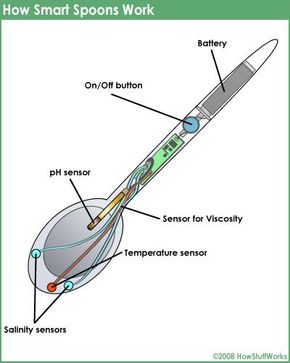It's been another long day at work, and the last thing you want to do is go home and cook for your family. No matter how hard you try, the peanut gallery will find some reason to complain. "The soup is too salty," says one child. Another child complains that his casserole is too runny. "This pie crust could really use some citrus," reports your spouse, who apparently moonlights as a food critic for the local newspaper.
What you need is an intelligent spoon, a mixing spoon that uses sensors to measure different food qualities, like acidity, during the cooking process. This automated kitchen utensil was developed by two students at the Massachusetts Institute of Technology (MIT) in 2005. The students were working in MIT's Counter Intelligence Lab, which tries to create smart technology products that make our time in the kitchen easier. Smart technology automates appliances and devices with computers so that most of the work and the required thought are eliminated from everyday tasks.
Advertisement
Some of the Counter Intelligence Lab's other cool innovations for kitchens of the future include the "Talking Trivet," which will let you know if something needs to be rewarmed, if it's too hot to touch or if it's ready to eat. Faucets will let you know both the temperature of the water and also if you're using too much of it. In the future, you could project recipes directly onto a countertop so the cookbook doesn't get dirty, and you could save electricity by never having to open your fridge just to know what's inside. Instead, a small camera and projection screen could let you know your fridge's contents when you're thinking about what's for dinner. But what about those intelligent spoons? How can they help with dinner? How do they use smart technology to taste food? Go on to the next page to find out what these spoons can stir up.




